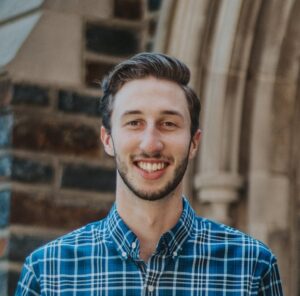Peter Hase, a fellow with The Graduate School’s Royster Society of Fellows, has received a prestigious Google Ph.D. fellowship in natural language processing. The Graduate School spoke with Hase about how the fellowship has influenced his time as a graduate student in the College of Arts and Sciences’ Department of Computer Science. Hase is from Greensboro, North Carolina, and completed his undergraduate studies at Duke University. His research focuses on machine learning and natural language processing. It also deciphers how artificial intelligence (AI) systems make decisions, especially for AI that uses human language data. His focus is to align machine learning systems with human values. He is broadly interested in topics relating to AI safety and in developing evaluation procedures for AI. 
How did you feel to be selected as a Royster fellow in 2019?
I remember I was out in Durham with some friends. It was a special moment for me, and it felt like a sign that North Carolina would be a good home for another five years.
What has the Royster fellowship program meant to you while at UNC-Chapel Hill?
It’s meant that I’ve gotten to know some really interesting people across a wide range of disciplines, starting from the beginning of my time in school here. It’s good to have a community like this available to you from the beginning of grad school, since it’s a big personal transition and a huge shift in the wider community you belong in, even for someone moving 30 minutes to come here. I hope that with my remaining time I can get to know more of the Royster fellows.
How has working with students across other disciplines shaped your academic experience?
I will say I did not personally go far into the interdisciplinary work in terms of co-teaching a seminar or co-authoring research together with my peers. But it is always a refreshing and grounding experience to hear about someone’s work from a department over, which tackles a totally different question about the world with a totally different set of methods. It’s a good reminder for computer scientists in particular, too, who are often at risk of thinking all problems can be solved with algorithms, especially when we’re left buried in our own work for too long.
What opportunities have you had thanks to the fellowship?
During my very first semester, I used some of my Royster travel funds to go to a conference in Washington state, way out in nature at a big lodge-type venue. This was my first academic conference, and I gave a talk in front of a scarily large audience. It was certainly a novel experience, and hopefully I’m better prepared for next time I get to do that kind of thing in person.
How do you balance the demands of graduate school and your own wellbeing?
I have loved playing soccer while in grad school. Three days a week this fall you can find me playing with a local league in the area.
